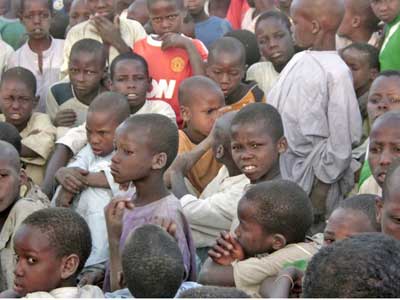Nigeria’s Almajiri, or Tsangaya, education system has long been a crucial part of Islamic tradition, deeply embedded in the cultural fabric of Northern Nigeria. Despite its historical significance and the vital role, it has played in educating millions of children, this system has been marginalised and left out of the national education framework such as the Universal Basic Education system. As a result, millions of Almajiri children are labeled as out-of-school, denied the formal education opportunities afforded. It is imperative that Nigerian leaders reconsider their approach to the Almajiri system, working towards its full integration into the national curriculum. This step is not just about policy; it is about ensuring that every Nigerian child receives an education that empowers him/her for the future.
The Almajiri system, particularly prevalent in the northern region, represents more than just religious instruction; it is a cultural legacy that has shaped the lives of generations of Hausa-Fulani children. However, the diversity in religion and ethnicity across Nigeria has contributed to a fragmented and often negative perception of this traditional form of education. The failure to integrate Almajiri education into the national education system has left millions of children without access to basic education, exacerbating Nigeria’s already alarming statistic of 18.3 million out-of-school children.
Successful examples from other countries demonstrate that integrating traditional Islamic education with national policies is possible and beneficial. Nations such as Tanzania, Mali, Senegal, Pakistan, and Indonesia have managed to blend their traditional Islamic education systems with formal curricula, ensuring that children receive both religious and secular education. These countries have recognised the value of their traditional education systems and have taken steps to ensure that they remain relevant in today’s world. Nigeria, however, has struggled to achieve this due to its complex diversity and the regional confinement of the Almajiri system, which has resulted in a lack of national interest. Political leaders, particularly those who benefit from the status quo, have been slow to champion the necessary reforms.
For Nigeria to move forward, it is crucial to address the misconceptions that surround Almajiri education. A common but misguided belief is that Almajiri education is outdated, or incompatible with modern educational standards.
In reality, the Almajiri system represents a rich tradition that can coexist with, and even enhance, contemporary education. Educating the public on the true nature of Almajiri education is essential to changing these misconceptions and fostering a more inclusive national dialogue.
Nigerian leaders must take a bold and proactive stance in reforming the Almajiri system. This involves not only integrating Almajiri education into the broader Islamic education curriculum but also extending it to cover basic and senior secondary school levels. By doing so, Nigeria can ensure that Almajiri children are not left behind but are instead equipped with the knowledge and skills needed to thrive in the modern world. This integration will also help reduce the number of out-of-school children, addressing one of the most pressing educational challenges facing the nation.
The integration of the Almajiri system into the national curriculum is a matter of justice and equality for millions of Nigerian children. It is also a critical step towards ensuring that Nigeria’s education system reflects the country’s rich diversity and heritage. By embracing and reforming the Almajiri system, Nigeria can create a more inclusive and effective education system that empowers all children, regardless of their background or region, to contribute meaningfully to the nation’s development. This is not just a policy imperative; it is a moral and national duty that will have far-reaching impacts on the future of Nigeria.
Tijjani Mukaddas wrote via [email protected]

 Join Daily Trust WhatsApp Community For Quick Access To News and Happenings Around You.
Join Daily Trust WhatsApp Community For Quick Access To News and Happenings Around You.


